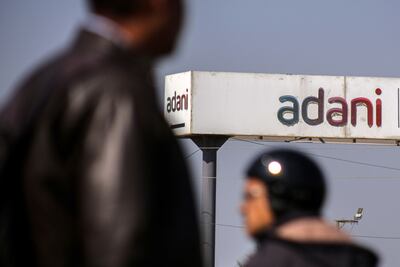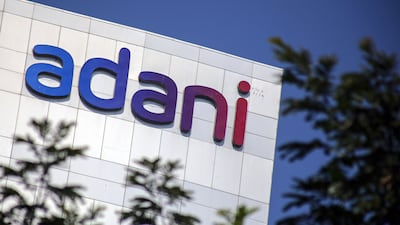Shares in Gautam Adani's eponymous group of companies plummeted on Thursday after the Indian conglomerate called off a 200 billion rupee ($2.43 billion) share sale citing “volatile market conditions”, extending the decline in the market value of its associated businesses to $108 billion.
The shares have been in free fall after claims of accounting fraud last week made by US short-seller Hindenburg Research, which said in a report that was shorting the conglomerate’s stocks based on concerns about its debt levels and use of tax havens.
“After a fully subscribed FPO [follow-on public offer], yesterday’s decision of its withdrawal would have surprised many,” Mr Adani said in a video address to investors on Thursday.
“But considering the volatility of the market seen yesterday, our board strongly felt that it would not be morally correct to proceed with the FPO.”
The decision to scrap Adani Enterprises' follow-on share sale “will not have any impact on our existing operations, as well as our future plans”, as the fundamentals of the company are strong, he said.
“Our balance sheet is healthy and assets robust. Our ebitda [earnings before interest, tax, depreciation and armotisation] levels and cash flows have been very strong and we have an impeccable track record of fulfilling our debt obligations,” Mr Adani said.
“We will continue to focus on long-term value creation and growth will be managed by our internal accruals.
“Once the market stabilises we will review our capital markets strategy … The strongest validation of our governance principles comes from several international partnerships we have built across our different entities.”
Mr Adani thanked investors for their support and said he was “confident” of securing support in the future.
Despite the market conditions, the secondary offer by Mr Adani’s flagship company was fully subscribed on Tuesday, drawing support from key Indian and international investors.
But the stock market rout on Wednesday continued, with shares in Adani Enterprises falling by 28 per cent. The slump continued on Thursday, with shares in the company down 26 per cent at the close of trading, after touching an intraday low of 35 per cent.
“Given the unprecedented situation and the current market volatility, the company aims to protect the interest of its investing community by returning the FPO [follow-on public offer] proceeds and [withdrawing] the completed transaction,” the company said on Wednesday in a filing to the Bombay Stock Exchange, where its shares are traded.
“Given these extraordinary circumstances, the company’s board felt that going ahead with the issue will not be morally correct. The interest of the investors is paramount and, hence, to insulate them from any potential financial losses, the board has decided not to go ahead with the FPO.”
All the proceeds received in escrow would be refunded, he said.
In a regulatory filing on Thursday, International Holding Company, the UAE's most-valuable listed company, which had invested $381 million in the share sale, said its funds had been returned to its accounts.
“India has a very broad spectrum of infrastructure companies,” Ashwini Vaishnaw, India’s Minister for Technology and Railways, told Bloomberg TV on Thursday.
“Whatever blip is there on the stock market is not going to affect the overall economy, I am very sure of that.”
The fallout from the market turmoil knocked Mr Adani out of the Bloomberg Billionaires Index's top ten wealthiest people globally, and subsequently prompted the company to withdraw the secondary share sale.
Mr Adani, once Asia's richest man, has given up the title to Mukesh Ambani. He is now ranked as the 13th richest person worldwide with a net worth of $72.1 billion as of Thursday.
Mr Adani's personal fortune has plunged more than $48.5 billion since the start of this year.
The decline in shares on Wednesday accelerated after Bloomberg reported that Credit Suisse had stopped accepting bonds issued by companies in the group as collateral for margin loans to its private banking clients.
On Thursday, Citigroup’s wealth arm stopped accepting the securities of companies in the group as collateral for margin loans, according to Bloomberg and Reuters.
The Reserve Bank of India asked lenders for details of their exposure to the Adani Group, according to Bloomberg and Reuters.
On Sunday, the Adani Group fired back at Hindenburg in a 413-page response, saying it had complied with all local laws and had made the necessary regulatory disclosures.
“We have an impeccable track record of servicing our debt,” Mr Adani said on Wednesday.
Companies in the group have a combined $34.7 million of coupon payments due this week on their dollar bonds.


